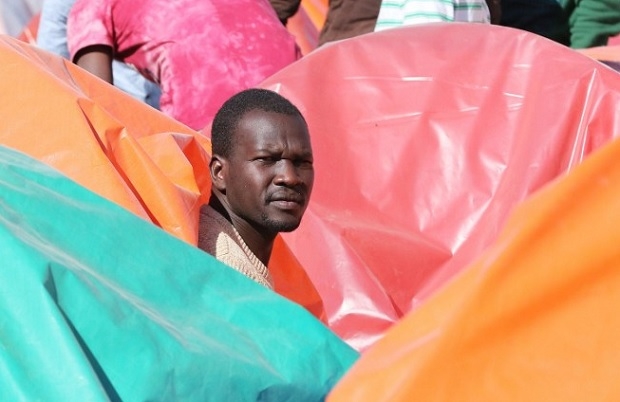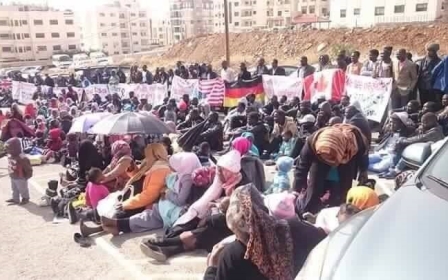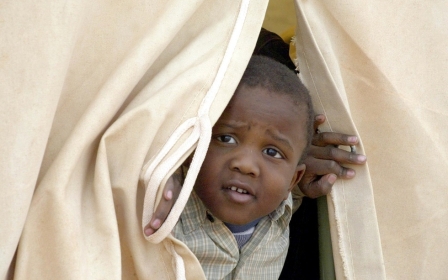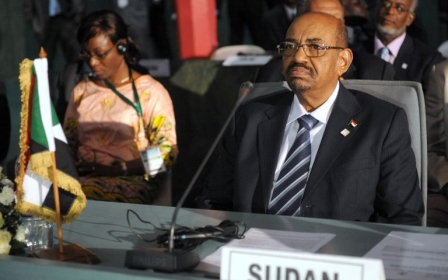Hundreds of Sudanese refugees deported from Jordan

Hundreds of Sudanese refugees were deported from Jordan on Friday morning, after a night of struggle with Jordanian police at an Amman detention centre during the night.
The deportation was prompted by a month-long demonstration outside Jordan’s UNHCR offices, where some 800 refugees had pitched tents to protest a lack of support and to demand relocation. In the early hours of Wednesday morning, the protest was dismantled and the refugees taken to an area close to Amman’s Queen Alia airport, where they were detained ahead of the the deportation Friday.
The UNHCR had urged the government not to deport the refugees and the move was condemned by human rights groups.
“There is no excuse for Jordan to deport vulnerable asylum seekers back to Sudan, regardless of how they entered the country,” Joe Stork, deputy Middle East director for Human Rights Watch, said. “Jordan should not punish these Sudanese merely because they protested for better conditions and for resettlement consideration.”
It is thought that the first planes to Sudan took off from Jordan this morning, with some refugees suffering injuries after Jordanian authorities used force against protesters late last night. Refugees at the detention centre said Jordanian police attempted to seize their passports and beat them after they refused. During the night, refugees refused to let Jordanian military into the warehouse where they were being held, and report that tear gas was used in the building as authorities attempted to gain access.
Reports of serious injuries have circulated, with refugees sharing photographs of apparently unconscious individuals. Those at the scene estimated that between 30 and 40 children were also held in the detention centre.
“The situation is very bad, they used force against us,” one refugee, who was among a small number that fled the detention centre yesterday, told Middle East Eye. “Some of us they have their hand broken, they took them and put them inside the airport. They say in Sudan the government is surrounding the airport.”
“The army broke down the door and they started taking people one by one,” Ali Yehya Abakar who was held with other refugees at the detention centre before being loaded onto a bus, said. He described being taken off the vehicle and searched by police every hour during the night, before being taken to to airport. From here, the refugees were deported to Sudan in groups. “The forces are surrounding us and from yesterday we didn’t get any food or water. They are treating us very forcefully, everything is very tough.”
Jordanian government spokesperson Mohammed Momani told Associated Press on Wednesday the definition of refugee does not apply to Jordan’s Sudanese population, because they arrived in Jordan seeking medical treatment and then claimed status as refugees. Representatives could not be reached for comment Friday morning.
The majority of Sudanese in Jordan fled the country’s Darfur region where a brutal civil war has seen mass rapes and killings by militias, and displaced up to 4.5 million people. They say they will be at risk of imprisonment or death if they are returned to Sudan. Under the 1951 Convention Relating the Status of Refugees, it is forbidden to return people to the country where they would be at risk from persecution and their life or freedom would be threatened.
“The Darfur people we are the victims of this war,” Ali Yehya Babakr said. “Our brothers have been killed. They commit genocide against us. The regime is committing genocide and we are the people that he is killing. The first things is we will be arrested and maybe killed, which is why we can’t go back.
“Everything has been destroyed,” he continued. “We have lost everything because of the way they treat us.”
Middle East Eye propose une couverture et une analyse indépendantes et incomparables du Moyen-Orient, de l’Afrique du Nord et d’autres régions du monde. Pour en savoir plus sur la reprise de ce contenu et les frais qui s’appliquent, veuillez remplir ce formulaire [en anglais]. Pour en savoir plus sur MEE, cliquez ici [en anglais].




